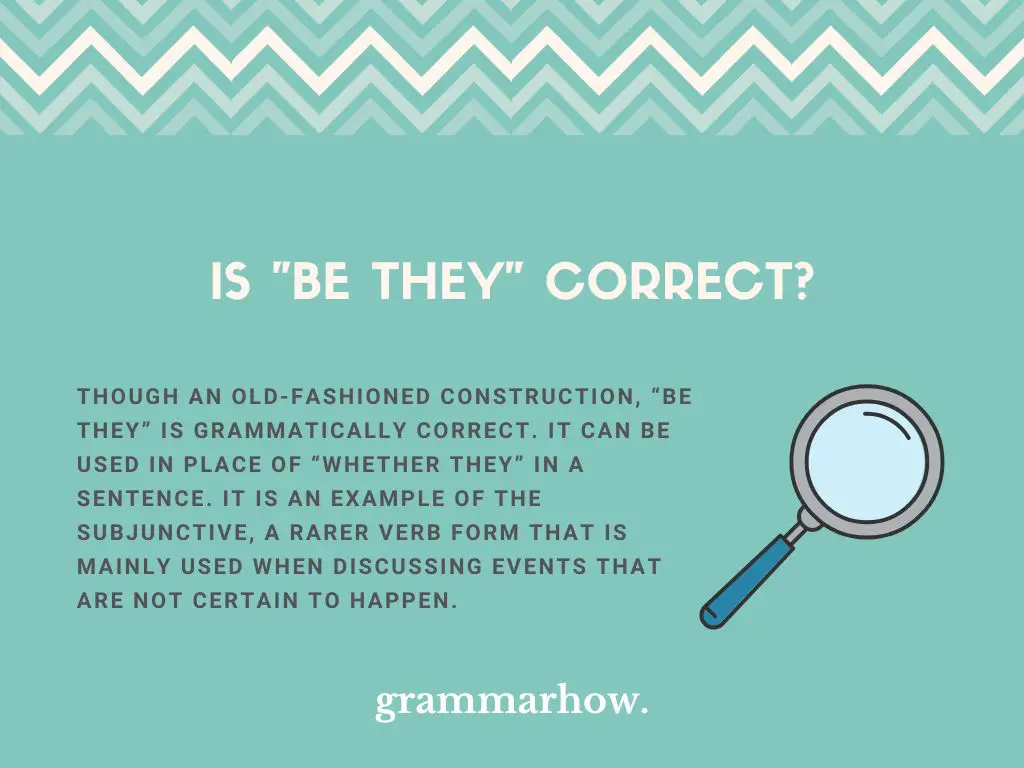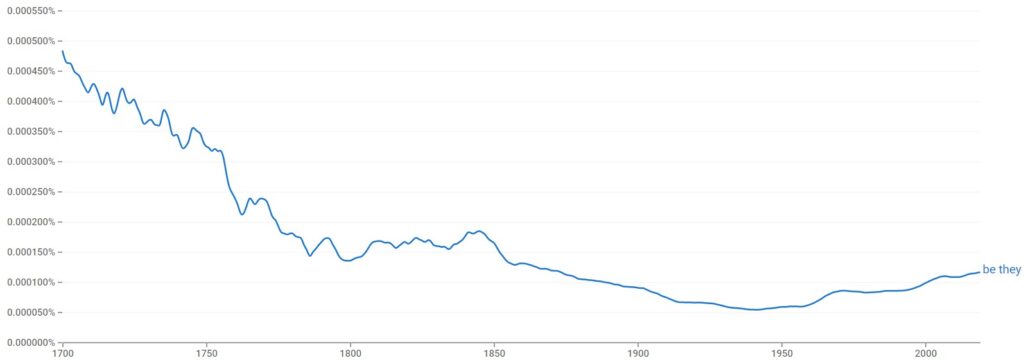Be they using correct grammar or be they making no sense at all? Sometimes it’s hard to tell. That’s why we’re here providing answers to all of your English language conundrums.
One such conundrum: was our use of “be they” just now correct? Or did it look a bit weird?
Is “Be They” Correct?
Though an old-fashioned construction, “be they” is grammatically correct. It can be used in place of “whether they” in a sentence. It is an example of the subjunctive, a rarer verb form that is mainly used when discussing events that are not certain to happen.

In the case of “be they”, the uncertainty is related to the state of the “they” being discussed. It’s a bit like Schrodinger’s cat: if you haven’t yet seen something, it can exist in two states of being in your mind at once.
- I will let the cats out of the box, be they alive or dead
What Does “Be They” Mean?
“Be they” is a grammatical construction used to express uncertainty about something or someone’s state of being. It means that the identity of the subject or object being referred to is not fixed in the mind of the speaker.
Think of Shakespeare’s famous quote from Hamlet:
- To be, or not to be
In this instance, Hamlet is contemplating whether or not he should continue living or being. His state of being is up for debate. The phrase “be they” is conveying the same concept: we don’t know whether the “they” is going to “be”, or not “be”.
How to Use “Be They” in a Sentence
As “be they” is a slightly antiquated grammatical construction, it works best when you’re trying to use a highly formal, literary, or flowery style. It’s not generally used in everyday conversation and will look a bit out of place in casual writing unless it’s being deliberately used for effect.
Here’s an example:
- Your friend coming round later; be they a vegetarian?
This question is a casual, everyday one and is written in a relaxed, modern tone – as such, “be they” feels out of place.
Now, let’s try adjusting the tone of this sentence:
- Your companion who is gracing our dining room this fine evening; be they an enjoyer of meat or do they graze exclusively upon leaves?
Much more fitting, right?
It may also be used in a modern setting if it is intended to be humorous or sarcastic:
- I hate vegetables and would fight them all given the chance; be they carrots, peas, or broccoli, they’re getting squashed if they step to me.
Here are a few more examples to help you get the feel for this phrase:
- Be they animals of the sea, land, or air, she resolutely refuses to eat them – it is the strangest of affectations.
- He wished to win the hearts of everyone he met, be they charming or sour, enigmatic or ostentatious, lovers or loathers, of the things he himself enjoyed.
- Be they truly happy together?
- These macaroons; be they good or bad?
Be They – Synonyms
There are options for more modern-sounding phrases that fulfill the same purpose as “be they”:
- Whether they
- Regardless of whether they
- Are they
“Be they” is interesting in that it can be used to mean any of the above phrases, even though they are not interchangeable. It can be used to question something’s state of being but also to declare that you don’t care about that state of being.
Is “Be They” Used in Modern English?
If we take a look at the Google Ngram Viewer we can see that the popularity of “be they” has been declining since the 1700s. Poor “be they”.

It hit its lowest point in the 1940s and has been making a slight resurgence throughout the 2000s. It’s still being used quite minimally though, so it’s unlikely it’ll be reclaiming the heights of its 1700s popularity anytime soon.
Final Thoughts
“Be they” is a grammatically correct, though antiquated, construction that can be used in place of either “whether they” or “are they”. It works best when used in writing that is deliberately old-fashioned or overly dramatic for effect. It looks out of place in writing that is otherwise modern.

Martin holds a Master’s degree in Finance and International Business. He has six years of experience in professional communication with clients, executives, and colleagues. Furthermore, he has teaching experience from Aarhus University. Martin has been featured as an expert in communication and teaching on Forbes and Shopify. Read more about Martin here.

